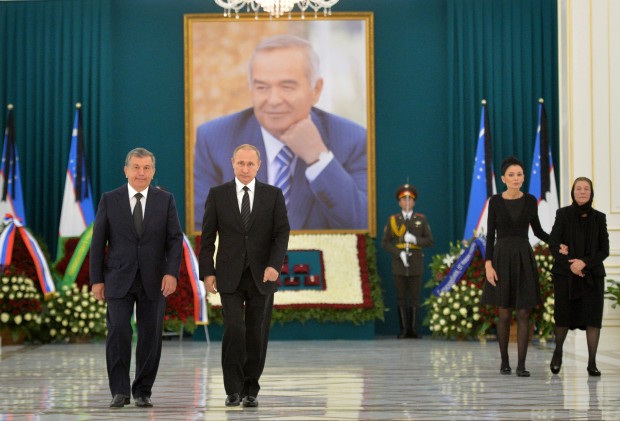
A Sensitive Power Transition in Uzbekistan

Orhan GAFARLI
Academic on International Relations at Ankara University of Turkey
Some news about the hospitalization of Islam Karimov, the former President of Uzbekistan had been spread out in late August. There was no any clear information about his illness. His daughter Lola Karimova declared on the social networks that he has been hospitalized due to cerebral hemorrhage. At the same time, the “Fergananews” published that Karimov has already died.
The media agency announced the news based on unofficial sources. Russian and the western media shared the same news accurately. But Uzbekistan officials denied that news on August 30. According to official sources, opposition groups tried to spread the wrong news. Some analysts argued the death of Karimov was not important than the available conflict among clans in the country. But his death was announced shortly by the officials.
After a short time, Uzbek Prime Minister Shavkat Mirziyoyev has been appointed the acting president by a decision of a joint meeting of the Senate and the Legislative Chamber of Uzbekistan’s Parliament on September 8.
Actually, following the death of Islam Karimov, Nigmatilla Yuldashev, the head of Senate should have come under the terms of the constitution.
It can be said that the Karimov supporters don’t want Yuldashev to increase his power. This process can change all balances among different groups. If Yuldashev would have come to power, he would be head of the Commander-in-Chief.
If we look at the domestic politics of Uzbekistan, we can point out that the rule of Karimov created an authoritarian atmosphere by closing political parties. The leaders of that parties escaped abroad during that period. Muhammad Salih who moved to Turkey is one of the prominent names among them.
Islam Karimov kept the balance among different clans during his regime. The clan reality is an important element to understand Uzbekistan. These clans have their own geographical quality and historical roots. The major ones are from Tashkent, Samarkand, and Fargana. As an addition to them, we can count Jizzakh, Kashkadarya, Harezm and Karakalpak as minors. After the gaining independence, Karimov systematically eliminated the members of Fergana clan. Thus the main political competition appeared between Tashkent and Samarkand clans. Karimov remained overall clan competitions although his roots base on Samarkand clan.
We can see that there is no impossible transition among clan if we check the social system of Uzbekistan. For instance, the interclan relations have remained always between Samarkand and Tashkent groups.
The name of the new presidential candidate was being discussed by Russia and the West. Prime Minister Shavkat Mirziyoyev, deputy PM Rustam Azimov and the Chief of National Security Rustam Inayotov were most prominent ones.
Rustam Inayotov is a key figure who keeps the critical position of the police, military and intelligence power which could consolidate Karimov regime. According to local sources, Inayotov could not have been candidate due to his old age (76) although he is available for the post of the Prime Ministry.
It is possible to see some supports from Russian media for the candidacy of Mirziyoyev. Aleksandr Dubnov, Russian political analyst wrote: “If Mirziyoyev comes to power, he will move Uzbekistan to the route of Collective Security Treaty Organisation and make Uzbekistan a member of Eurasian Economic Union.”
Obviously, Rustam Inayotov, the head of National Security supported the candidacy of Mirziyoyev. That is why Tashkent clan is bothered with the power transition to the head of senate during the announcement of Karimov’s death.
Officials canceled the August 31, the Independence Day celebrations. PM Mirziyoyev laid a wreath in front of the Independence Statue. It was accepted as a show to see new president of the country. Because the head of senate should act due to the nonexistence of the president.
The deputy PM, Rustam Azimov is accepted as a Western-oriented person because of his graduation from Oxford University and official duties to Europe and the US. He was especially appointed for C5+1 platform’s representation. Azimov was going abroad much more than Mirzoyev recently. At the same time, Azimov has very close relationship with the Karimov family. He has a family relationship with Samarkand clan although he is part of Tashkent clan. But Rustam Inayatov, the head of National Security will be the person who will make the last decision because of his powerful position.
It can be illusory to analyze the power transition in Uzbekistan with the help of clan reality. The political competition dramatically changed and interclan relations improved during the last 20 years.
It is early to say whether the power transition will be soft or hard in Uzbekistan, it depends on the group relations in the power. There is an example of soft transition in near history of Turkmenistan which is another Central Asian country. But we should be careful about different social, political and economic dynamics of two countries.
If all Uzbek clans come to an agreement, there would be a soft transition. The main important issue is to keep political balance after coming to power. Another key point is about democratization process of Uzbekistan.
It’s possible integration to the West or the Eurasian Economic Union will lead Uzbekistan to be opened up to the world. Therefore the balance among clans and democratization process should be managed perfectly.


